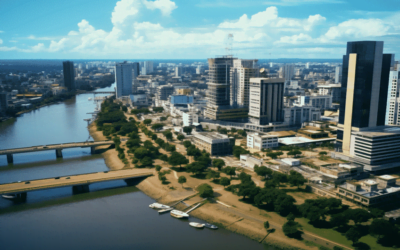Hey there, fellow drone enthusiasts and curious readers! I know that if you’re here, you’ve probably got a burning question on your mind – “What are the drone laws in Latvia?” It’s a common query among drone pilots, both newcomers and seasoned flyers.
Well, let me assure you, I’ve done some deep digging to uncover all the details you need.
So, what’s the scoop on Latvia’s drone laws, you might ask? Well, stick around, and I’ll provide you with the comprehensive lowdown. I’ve delved into the labyrinth of regulations, taken a closer look at the guidelines, and dug up insights that I’m eager to share with you.
Whether you’re a hobbyist looking to explore Latvia’s scenic beauty from above, a visitor curious about the local drone rules, or a commercial operator seeking to navigate the legal skies, I’ve got you covered.
Ready to get the inside track on Latvia’s drone laws? Buckle up, because, in this article, we’re going to unravel the dos and don’ts of flying drones in Latvia.
Whether you’re navigating the skies for fun or business, this guide will equip you with the knowledge you need to stay compliant and enjoy your drone adventures to the fullest. So, let’s dive in and discover how you can spread your drone’s wings in Latvia while staying on the right side of the law.
General Latvia Drone Laws

Before you embark on your drone adventures in Latvia, it’s essential to understand the basic drone laws that apply to all operators. These fundamental regulations form the foundation for responsible and safe drone flying in this beautiful Baltic nation. Let’s dive into the key points that every drone enthusiast needs to know.
The Basics
In Latvia, drone pilots are required to adhere to a set of fundamental rules to ensure the safe and responsible operation of their unmanned aerial systems.
These rules apply to all operators, whether you’re a hobbyist capturing stunning aerial shots, a commercial drone pilot conducting business operations, or a visitor exploring the country’s scenic landscapes.
Prohibitions and Restrictions
Now, let’s get into the nitty-gritty. One of the critical regulations you must bear in mind is the prohibition on flying your drone over people or large crowds. Safety is paramount, and this rule helps minimize the risks associated with drone flights.
Additionally, flying your drone within 50 meters of buildings, people, or vehicles not associated with the drone operation is a no-go. This rule ensures that you maintain a safe distance from potential hazards and respect others’ privacy.
Furthermore, it’s important to note that your drone should never venture past the visual line of sight or an altitude of 200 meters, whichever is closer. This guideline ensures you maintain control and awareness of your drone’s whereabouts.
Latvia’s drone laws also emphasize that you should respect the privacy of individuals while operating your drone. Flying your drone within 10 kilometers of airports or areas where aircraft are operating is strictly prohibited to avoid any airspace conflicts.
Also Read: Drone Regulation in Laos 2024
Flying Your Drone in Latvia

If you’re gearing up for a drone adventure in Latvia, understanding the rules and regulations is paramount. As a member of the European Union (EU), Latvia follows a set of regulations that apply to all drone operators.
These regulations, set by the European Union Aviation Safety Agency (EASA), are complemented by Latvia’s country-specific rules. Let’s navigate through the skies of drone regulations in Latvia.
EU Membership and Drone Regulations
Latvia’s EU membership brings it under the umbrella of drone regulations put in place by the European Union Aviation Safety Agency (EASA). These regulations are designed to ensure the safe operation of drones throughout the EU, including Latvia.
Whether you’re a resident, a visitor, or a commercial operator, these EU regulations set the groundwork for drone flying within the European Union.
Categories of Drone Operations
In the world of drone operations, risk assessment is a key factor. To address this, EU drone regulations classify operations into three categories: Open, Specific, and Certified. For our focus, let’s zoom in on the Open Category.
This category is the go-to for many leisure drone enthusiasts and low-risk commercial activities in Latvia and other European countries.
Now, what’s the Open Category all about? It’s the realm where you can operate your drone without needing prior authorization, provided certain conditions are met. These include ensuring your drone’s total takeoff mass is less than 25 kilograms and maintaining a visual line of sight at a maximum altitude of 120 meters.
The specifics might vary depending on the subcategory of operation, such as A1, A2, or A3, but the key is to fly safely and responsibly.
Also Read: Drone Regulation in Kyrgyzstan 2024
Hobbyist Drone Laws

Are you flying drones purely for the thrill and joy of capturing stunning aerial perspectives? If so, you’re likely a hobbyist drone operator, and it’s crucial to understand the specific regulations that apply to your leisurely flights in Latvia. Let’s explore the world of hobbyist drone laws in this Baltic nation.
Regulations for Hobbyists
Hobbyist drone operators in Latvia enjoy certain freedoms but are still bound by regulations to ensure the safety of all. The rules you need to follow are designed to maintain responsible drone use and prevent potential hazards.
Whether you’re flying a drone for recreational photography or simply for the fun of it, these guidelines apply to you.
Registration, Licenses, and Camera Drones
First and foremost, if you’re operating a drone with a takeoff mass exceeding 250 grams or if your drone is equipped with a camera, you’ll need to register it.
This process is relatively straightforward and helps authorities keep track of drone operations. Plus, it ensures a level of accountability that contributes to safer skies.
In Latvia, you won’t require a drone pilot license for hobbyist flights. However, if you’re flying a drone weighing over 1.5 kilograms, it’s recommended that you consider liability insurance.
While it’s not mandatory, having insurance can offer peace of mind and financial protection in case of any unexpected incidents during your hobbyist drone operations.
The Insurance Recommendation
Let’s dive a bit deeper into drone insurance. While it’s not compulsory for hobbyist drone operators, it’s strongly recommended, especially if your drone’s weight surpasses the 1.5-kilogram mark. Having insurance that covers potential damages or liabilities can make your drone adventures worry-free.
It’s a smart move to safeguard your drone and, more importantly, ensure responsible drone flying in Latvia. While you may be flying for fun, safety should always be a top priority.
Also Read: Drone Regulation in Kuwait 2024
Commercial Drone Laws

For those looking to elevate their drone hobby into a business venture or provide professional aerial services in Latvia, understanding commercial drone regulations is crucial. These rules ensure the safe operation of drones in commercial settings, and here’s what you need to know.
Regulations for Commercial Operators
Commercial drone operators in Latvia must adhere to specific regulations that apply to their business endeavors. These regulations are designed to maintain safety standards and ensure that commercial drone operations are conducted responsibly and professionally.
Licenses, Registration, and Insurance
If you’re venturing into commercial drone services, there are a few key requirements to consider. First and foremost, you’ll need a commercial drone pilot license.
This demonstrates your competence and proficiency in operating drones for professional purposes. Additionally, drone registration is mandatory for commercial operators, ensuring that authorities can track your drone’s activities.
Moreover, drone insurance is a must for commercial drone operations in Latvia. This insurance provides coverage for potential damages or liabilities that may arise during commercial drone services.
It’s a critical component of responsible drone operations and is essential to protecting both your business and the interests of your clients. Whether you’re capturing breathtaking aerial footage or providing specialized services, these regulations ensure that your commercial drone operations adhere to the highest safety standards.
Also Read: Drone Regulation in Kosovo 2024
Drone Laws for Visitors

Exploring the beautiful landscapes of Latvia and considering flying your drone during your visit? It’s essential to be aware of the drone regulations for visitors and tourists in this charming Baltic nation. Let’s delve into the rules that apply to those who wish to capture unforgettable memories from the sky.
Rules for Visitors and Tourists
Latvia welcomes drone enthusiasts from around the world, and it’s entirely possible to enjoy drone flights during your visit. However, as a foreign visitor or tourist, you must familiarize yourself with the specific rules and regulations that pertain to your drone activities in Latvia.
Foreign Visitor Requirements
When visiting Latvia, you’ll need to check whether your home country’s pilot license is valid in Latvia. If it isn’t, you might need to acquire a temporary pilot license that allows you to operate drones during your stay.
Drone registration is generally required for visitors and tourists unless your drone is already registered in a European Union member state.
While drone insurance isn’t mandatory for tourists, it’s strongly recommended. Having insurance coverage can offer peace of mind during your travels and ensure that you’re financially protected in the event of any unexpected incidents.
Whether you’re a seasoned drone pilot or a beginner, these guidelines help ensure that your drone adventures in Latvia are enjoyable, safe, and in compliance with local regulations.
Also Read: Drone Regulation in Korea, South 2024
Drone Laws for Government Operators

Government drone operations in Latvia play a vital role in various sectors, from public safety to infrastructure monitoring.
Understanding the regulations that govern these operations is essential to ensuring they are conducted smoothly and responsibly. Let’s dive into the specific drone laws that apply to government operators in Latvia.
Regulations for Government Operators
Government drone operators in Latvia operate under a unique set of regulations designed to meet their specific needs. These regulations ensure that government agencies can carry out their missions effectively and safely using drone technology.
Licenses, Registration, and Insurance
One noteworthy aspect of government drone operations in Latvia is the absence of a requirement for drone insurance. While commercial and hobbyist operators must have insurance coverage, government entities are exempt from this requirement.
This is because government operations often serve the public interest and are conducted with the highest safety standards in mind.
Government drone pilots, however, are still required to obtain the necessary pilot licenses and ensure that their drones are properly registered. These measures help maintain accountability and transparency in government drone operations while contributing to overall safety.
Whether it’s for surveillance, disaster response, or other critical tasks, these regulations ensure that government drone operations in Latvia are carried out with expertise and responsibility.
Also Read: Drone Regulation in Korea, North 2024
Air Travel with Drones in Latvia

For drone enthusiasts visiting Latvia or those looking to explore its breathtaking landscapes while capturing stunning aerial shots, understanding the rules for traveling with drones on airplanes is essential. Let’s delve into the guidance on bringing your drones on your Latvian adventure.
Traveling with Drones
When planning your journey to Latvia, you’ll likely want to bring your drone to capture the scenic beauty from above. It’s crucial to familiarize yourself with the rules for traveling with drones.
Drones should ideally be carried in your carry-on luggage rather than checked baggage. This is in line with international regulations and helps ensure the safety of your valuable equipment.
Importance of Carry-on Luggage
The Montreal Convention, a set of international rules for air travel, states that airlines are generally liable for losses of up to approximately USD 1,000.
This means that if your drone is worth more than this amount and you cannot bring it onto the plane as part of your carry-on luggage, you should consider shipping it via reliable courier services like DHL, FedEx, or UPS. It’s essential to fully insure your shipment for added protection.
While traveling internationally, issues like theft and lost luggage are not uncommon, especially if your flight involves multiple connections. To avoid any potential complications, keep your drone batteries in a medium-sized Lipo Battery Bag. Airlines consider lithium-ion batteries “dangerous goods,” and there are strict regulations governing their transport on planes.
By following these guidelines, you can ensure a smooth and hassle-free journey to Latvia while having your drone ready to capture the country’s natural beauty from the skies.
Also Read: Drone Regulation in Kiribati 2024
No Fly Zones in Latvia

Before you embark on your drone adventures in Latvia, it’s crucial to understand the concept of no-fly zones and restricted areas that might impact your drone operations. Let’s explore what these zones mean for drone enthusiasts and how to navigate them safely.
Understanding No-Fly Zones
No-fly zones refer to areas where drone operations are restricted or prohibited. These zones are typically designated to ensure the safety and privacy of individuals and property.
In Latvia, as in many other countries, these zones include sensitive areas like government facilities, military installations, and airports, where the use of drones or camera drones is strictly prohibited.
Navigating No-Fly Zones
To fly your drone in no-fly zones or restricted areas in Latvia, you may need to obtain the necessary authorizations and permissions. It’s essential to follow the established rules and regulations within these zones.
These rules are in place to maintain safety and protect privacy. Be sure to check for the latest information and updates on no-fly zones, as regulations may evolve. By adhering to these rules, you can explore Latvia’s scenic landscapes and cultural treasures responsibly and safely.
Also Read: Drone Regulation in Kenya 2024
Final Thoughts on Latvia Drone Laws

As we wrap up our exploration of Latvia’s drone laws, let’s take a moment to recap what we’ve learned and underscore the significance of responsible drone operations in this beautiful Baltic country.
Throughout this journey, we’ve delved into the world of Latvia’s drone regulations. We’ve covered the rules for hobbyist and commercial drone operators, regulations for visitors and government drone pilots, and even the nuances of traveling with your drone. The fundamental takeaway is the importance of understanding the specific regulations and requirements based on your category of operation.
Whether you’re a hobbyist capturing breathtaking aerial shots or a commercial operator providing valuable services, adhering to Latvia’s drone laws is crucial. These regulations have been established to ensure safety, protect privacy, and preserve the beauty of this nation.
Each category of drone operation comes with its own set of rules and requirements, which must be followed diligently.
In conclusion, it’s our shared responsibility to fly drones in Latvia with respect for the law and the people who call this country home. Responsible and safe drone operation not only keeps you in compliance with the rules but also fosters positive relationships within the community.
So, as you plan your drone adventures in Latvia, remember to fly high, fly safe, and embrace the beauty of this extraordinary country through the lens of your drone.
Frequently Asked Questions on Latvia Drone Laws
1. Can I fly a drone as a tourist in Latvia, and are there specific rules for visitors?
You can fly your drone as a tourist in Latvia. Visitors to Latvia are allowed to operate drones under certain conditions. You’ll need to follow the regulations set forth by the Civil Aviation Authority of The Republic of Latvia (CAA).
This includes registering your drone in Latvia or your home country if not registered with the European Union Aviation Safety Agency (EASA). While you don’t need drone insurance as a tourist, it’s strongly recommended. Ensure you abide by Latvia’s no-fly zones and respect the general safety guidelines.
2. What are the key rules for hobbyist drone operators in Latvia?
Hobbyist drone operators are allowed to fly in Latvia, but they must adhere to specific rules. You’ll need to register your drone if it weighs over 250g or if it’s equipped with a camera.
A pilot license is required for hobbyists, and it’s essential to follow the regulations for the open, specific, or certified categories of drone operation based on the level of risk involved. While drone insurance is not mandatory, it’s a wise choice to protect yourself and others.
3. What are the requirements for commercial drone operators in Latvia?
Commercial drone operators are permitted in Latvia, but there are distinct requirements. To operate commercially, you’ll need a commercial Latvia drone pilot license.
Drone registration is also mandatory for commercial drone operators. Unlike hobbyists, commercial operators are obliged to have drone insurance to cover potential liabilities and risks associated with their business operations.
4. What’s the process for registering as a drone pilot or operator in Latvia?
The operator registration procedure starts by registering as a drone operator in Latvia, which is valid for one year. EU residents should register in the EU member state of their main residence or place of business, and non-EU residents should register in Latvia if it’s their first place of operation within the EU.
Registration is compulsory for operators of drones weighing 250g or more, or less than 250g but capable of speeds greater
The operator registration procedure starts by registering as a drone operator in Latvia, which is valid for one year. EU residents should register in the EU member state of their main residence or place of business, and non-EU residents should register in Latvia if it’s their first place of operation within the EU.
than 90km/h or equipped with a camera or microphone.
5. Can I fly my drone over populated areas and cities in Latvia?
Flying your drone over people or large crowds, within 50m of buildings, people, or vehicles not involved in the operation, or past the visual line of sight is prohibited. It’s essential to respect others’ privacy and avoid flying your drone within 10km of airports or areas where aircraft operate. The safety of your flights is paramount.
Always ensure you fly during daylight hours and in good weather conditions, and avoid sensitive areas, including government and military facilities, as well as gatherings of people, bridges, railways, motorways, and other restricted zones.












